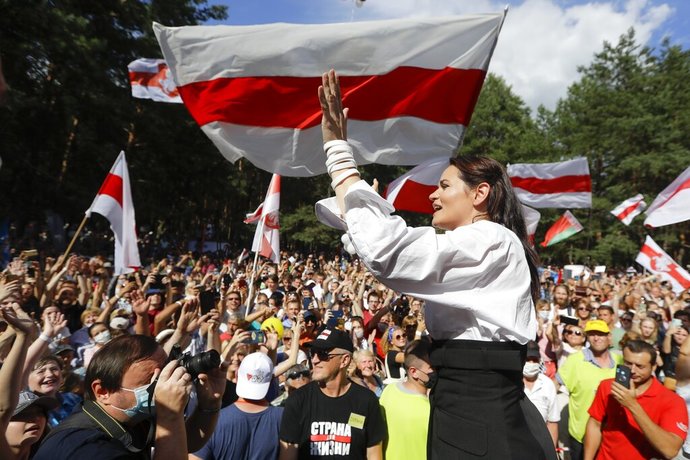The upcoming election in Belarus will not bring about the democratic governance for this country. The reason for that is the absence of independent opposition leaders. Most of potential opposition candidates have ties to Russia and look like Russian game to replace the incumbent President Alexander Lukashenko.
Following the Soviet break-up, Belarus became a closed-off country with a serious counterintelligence and police regime borrowed from Soviet times. Belarus was the only post-Soviet country to stick with the KGB name for the state security service. Even Russia, where the leaders feel strong nostalgia for the Soviet Union, has not retained the KGB, replacing it with the FSB.
The opposition, amid total police control, was unable to shape up as a public political structure. Therefore, the government fended them off from developing a legal representation, amid internal demand for the protest and opposition movement by the people. Every current opposition leader is in fact a person who uses electronic media to communicate with the voters. That implies remote interaction, and, consequently, possible external influence while shaping the image and perception for such politicians.
Viktor Babariko was backed financially by Russian Gazprom, and Svetlana Tikhanovskaya is backed by Russian oligarch Alisher Usmanov’s media. Opposition leader Valery Tsepkalo fled from Minsk to Moscow, stayed there for a while ahead of coming to Kyiv and made an appeal to Putin, signaling his complete loyalty to the Kremlin. Thus, although there are no ties whatsoever between the Belarusian opposition and the West, the channels of interaction with the Kremlin are clearly visible. That means the pro-Western nature of the opposition movement in this country is a myth.
None of the candidates for the presidency in Belarus on August 9 election took part in “Let’s Defend Independence” rally in December 2019, where representatives of 15 parties and movements participated, calling to prevent Russia from absorbing Belarus. Opposition then claimed the initiatives for deeper integration between Russia and Belarus were targeting to extend the term of “Putin’s rule at the cost of destroying Belarus’ sovereignty.”
We argue that the bloody scenario of a takeover in Belarus will enable the Kremlin to smooth the negative effect of zeroing out power in Russia itself by sidetracking attention. For that purpose, the Lukashenko regime toppling should be pictured as an action performed by the West.
The main risk is that the incumbent president might be removed by force under the guise of a pro-Western regime change in Belarus, as it was in Abkhazia, where a Russian protégé was replaced by another Moscow’s stooge to minimize corruption losses of Russian funding. The Kremlin’s mission in Belarus would be to make Minsk more pliable in economic matters with Moscow, to cool off Belarus’ active foreign policy and to transfer its work with external partners through mediation by the Kremlin. Moscow has been obviously irritated with Lukashenko’s line recently, as he makes harsh statements towards Russia and disagrees with the rules of the game the Eurasian Economic Union imposed on him. Moscow understands that Lukashenko is the last “dictator in Europe”, therefore, the scenario of his toppling under the guise of a color revolution might ring true.
We stick to the opinion that Russia’s Wagner Group, detained in Belarus, was geared to ignite the protests by killing opposition members in the streets, followed by shuffling off the blame on to Belarusian law enforcement agencies. Such scenario was a writing on the wall for Kyiv, submitting a request for Wagner mercenaries’ extradition from Belarus. It is not excluded that some of them might be suspected in Ukraine of shooting Maidan activists during the 2014 Revolution.
Read more: Russia gearing up for meddling in elections in Belarus




